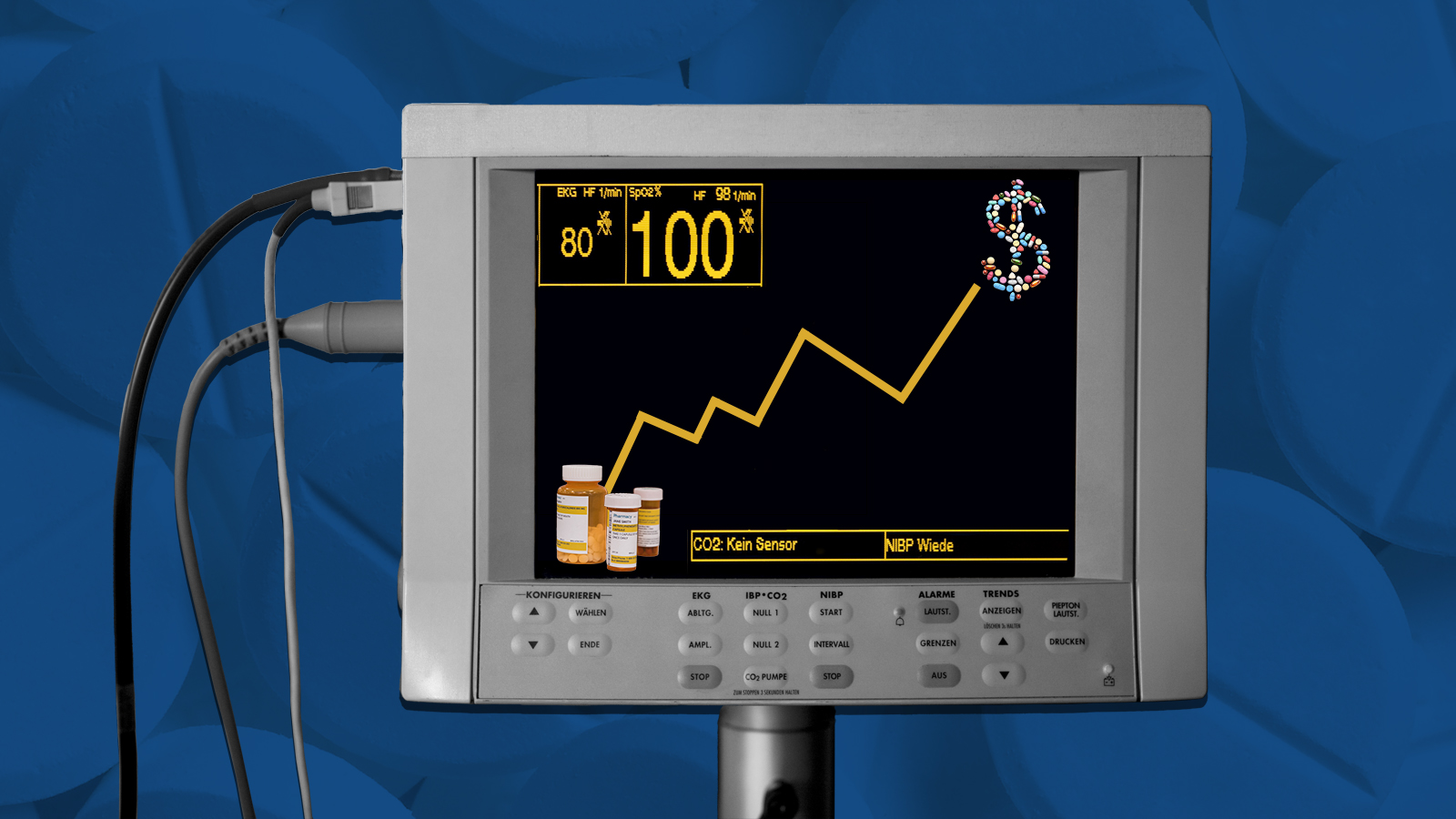Will Medicare drug price controls save lives?
Medicare starts negotiating lower drug prices over Big Pharma protests


A free daily email with the biggest news stories of the day – and the best features from TheWeek.com
You are now subscribed
Your newsletter sign-up was successful
The Biden administration has named the first 10 prescription medicines subject to price negotiations by Medicare under last year's Inflation Reduction Act. The list is made up of some of Medicare's most costly drugs, including popular blood thinner Elequis from Bristol Myers Squibb, and rheumatoid arthritis treatment Enbrel from Amgen, and other treatments commonly prescribed for the 66 million Americans covered by Medicare and 94 million on Medicaid, Axios reported. Medicare will make its initial price offers in February 2024, and drugmakers will have a month to accept or make a counteroffer.
Proponents say the change will help Medicare beneficiaries, most of them ages 65 and up, who struggle to pay for drugs that cost two to three times more in the United States than in other countries. Medicare pays twice as much for these medicines than the Department of Veterans Affairs, which already negotiates its prices, President Joe Biden said, according to Reuters. Once lower prices are in place, 9 million seniors currently paying as much as $6,497 out of pocket each year see big savings, Biden said, making this the "start of a new deal for patients."
But drug companies have filed a barrage of lawsuits trying to block the negotiation initiative. They argue that this program forces them to endorse lower prices as fair, even if they don't think they are, and will reduce their revenue so sharply it will discourage spending on research to find new cures, doing more harm than good. Will Medicare's price negotiations save money and lives or hurt patients by discouraging the development of the next generation of blockbuster drugs?
The Week
Escape your echo chamber. Get the facts behind the news, plus analysis from multiple perspectives.

Sign up for The Week's Free Newsletters
From our morning news briefing to a weekly Good News Newsletter, get the best of The Week delivered directly to your inbox.
From our morning news briefing to a weekly Good News Newsletter, get the best of The Week delivered directly to your inbox.
Patients stand to save a lot of money
This is a "milestone for the U.S. health system," said Dylan Scott at Vox. Medicare has "enormous leverage," and that's what it will take to force Big Pharma to make drugs more affordable. "The United States pays more for prescription drugs than any other country in the world, and yet, compared with other nations' health systems, the U.S. government has had limited power to try to bring prices down." This has given Big Pharma "carte blanche" to set sky-high prices. Letting Medicare negotiate a better deal will save patients money, starting with the medications for chronic conditions included on the first list. Next up could be the "highest-cost medications for serious acute illnesses like cancer."
Careful what you wish for, stated The Wall Street Journal in an editorial. The Inflation Reduction Act requires Medicare to negotiate much lower prices for 10 drugs this year and 60 by 2029, with minimum reductions of 25% to 60% of list prices and no price floor. Drugmakers that don't negotiate or that reject the government's offer face "crippling" consequences in the form of a huge daily excise tax. "This is extortion, not negotiation," and it will "reduce venture biotech investment by limiting potential future profits." Fortunately, the Supreme Court is likely to find these "sham negotiations" violate constitutional protections against excess fines and the uncompensated taking of private property. If the government isn't stopped, the "unseen costs" of its heavy-handedness will "include lives that could have been saved or extended by new treatments that were delayed or never developed."
Drugs don't help if you can't afford them
There's no denying that "prescription drugs are critical to health," said Lawrence O. Gostin, Andrew Twinamatsiko and Zachary Baron at MedPage Today. But even a miracle cure won't save you if it's priced beyond your reach. "Drug costs remain a barrier" for many people trying to "manage chronic and life-threatening conditions — especially seniors." Average net prices for Medicare outpatient brand-name prescription drugs "more than doubled between 2009 and 2018, from $149 to $353, with each Medicare enrollee spending $2,700 on average." And Big Pharma contributed to the crisis with moves like "gaming the patent system to extend market monopolies, suppressing competition, abusing citizen petitions, and price fixing."
In theory, drug companies don't have to go along if they think Medicare is cutting a "one-sided deal," stated the Toledo Blade in an editorial. "In reality, quitting the program is not an option," because seniors covered by the federal insurance system are the "biggest users of prescription drugs." But there's no reason for major drugmakers to be bitter. They've been protected from negotiation by Medicare for 20 years at the expense of people who struggled with the "unsustainable burden" of paying "artificially maintained" high prices. "It's time to stop making the taxpayer inflate the profits of the drug companies."
A free daily email with the biggest news stories of the day – and the best features from TheWeek.com
Harold Maass is a contributing editor at The Week. He has been writing for The Week since the 2001 debut of the U.S. print edition and served as editor of TheWeek.com when it launched in 2008. Harold started his career as a newspaper reporter in South Florida and Haiti. He has previously worked for a variety of news outlets, including The Miami Herald, ABC News and Fox News, and for several years wrote a daily roundup of financial news for The Week and Yahoo Finance.
-
 Quentin Deranque: a student’s death energizes the French far right
Quentin Deranque: a student’s death energizes the French far rightIN THE SPOTLIGHT Reactions to the violent killing of an ultra-conservative activist offer a glimpse at the culture wars roiling France ahead of next year’s elections.
-
 Secured vs. unsecured loans: how do they differ and which is better?
Secured vs. unsecured loans: how do they differ and which is better?the explainer They are distinguished by the level of risk and the inclusion of collateral
-
 ‘States that set ambitious climate targets are already feeling the tension’
‘States that set ambitious climate targets are already feeling the tension’Instant Opinion Opinion, comment and editorials of the day
-
 Sepsis ‘breakthrough’: the world’s first targeted treatment?
Sepsis ‘breakthrough’: the world’s first targeted treatment?The Explainer New drug could reverse effects of sepsis, rather than trying to treat infection with antibiotics
-
 Scientists are worried about amoebas
Scientists are worried about amoebasUnder the radar Small and very mighty
-
 A Nipah virus outbreak in India has brought back Covid-era surveillance
A Nipah virus outbreak in India has brought back Covid-era surveillanceUnder the radar The disease can spread through animals and humans
-
 Deaths of children under 5 have gone up for the first time this century
Deaths of children under 5 have gone up for the first time this centuryUnder the radar Poor funding is the culprit
-
 A fentanyl vaccine may be on the horizon
A fentanyl vaccine may be on the horizonUnder the radar Taking a serious jab at the opioid epidemic
-
 Health: Will Kennedy dismantle U.S. immunization policy?
Health: Will Kennedy dismantle U.S. immunization policy?Feature ‘America’s vaccine playbook is being rewritten by people who don’t believe in them’
-
 Nursing is no longer considered a professional degree by the Department of Education
Nursing is no longer considered a professional degree by the Department of EducationThe Explainer An already strained industry is hit with another blow
-
 Nitazene is quietly increasing opioid deaths
Nitazene is quietly increasing opioid deathsThe explainer The drug is usually consumed accidentally
